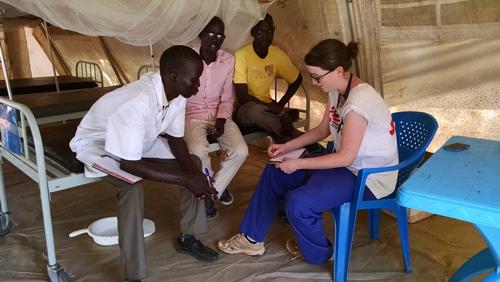- Jillian Loveland returned a few weeks ago from her mission with Medecins Sans Frontieres (MSF) in Old Fangak, South Sudan where she spent six months as head nurse.
- She was part of the team that opened the project last November.
- On her way back home she sat down with us to talk about her mission, the achievements, and the difficulties she faced daily in an area ruled by conflicts and civil wars.
We were few and it was difficult to find qualified people
“There were five of us on the ground - a project coordinator, a logistician, a physician, I was head nurse, and there was a first mission nurse on the project so it was really small. The problem is the airstrip was only 700 metres long, you couldn’t land a plane that could carry more than six passengers so for evacuation purposes we had to keep the team seven or less, with the idea you could put seven people on the plane if you flew with one pilot.
We worked with the existing staff of a small American NGO that ran the hospital before and then we hired some of our own staff from the displaced populations who had worked for MSF in Malakal before. But just to give you an idea, I posted a job for a nurse and I got two CVs. We’re the largest employer in the entire town and there were no qualified people so I only got two applications.
One of the best people I had working in our emergency room - which was in a tent - at the beginning of the project had never touched a patient before. I taught him how to take temperatures and count pulse rates, and by the time I left he was one of our best nurse assistants. He was doing IVs, doing injections, and helping with resuscitations.”
Money can’t buy anything - there’s nothing to be bought
“The hospital is in the opposition zone. Normally the only routes in are by river or plane, but this is an area that has seen heavy fighting and supplies for the population - healthcare, logistical supplies, even basics like soap - could not get through the front lines. No traders could get through to the town with their goods.
Our national staff has complained because we gave them money, but what can you do with money? There was nothing to buy so our nurses and our clinical officers asked us for soap as payment. They preferred to have soap or buckets or slippers than money because money couldn’t buy anything.
There was no food to be bought. Everybody relied on the World Food Program (WFP) for food. People farmed but because it was the dry season, there was no harvest and there were also so many displaced persons from Phom el-Zeraf and Malakal in the north that any harvest would be insufficient.”
They preferred to have soap or buckets or slippers than money, because money couldn’t buy anything.Jillian Loveland, former head nurse in Old Fangak, South Sudan
We had 44 patients all at once
“At the beginning of the project we treated mainly combat wounds but then the fighting stopped in the area at the end of December, January, February and through most of March. So at that point, we were treating mainly kala azar, malaria, pregnancies, complications with pregnancies, complications with malnutrition and then, at the end of March, we got another giant mass casualty. We had 50 people all at once come from the front, and all of sudden we had lots of wounded again.
For these mass casualties, we got word at about 12:30 that they were coming. We didn’t know how many, we didn’t know where they were coming from, we just knew that there was fighting that morning. We started setting up for 50 because 46 was the most that had ever come in the months before. Then at 5:30, 44 of them came, 44 all at once off the river.
We took care of 44 patients, stabilised them, and treated them. Around 9:15 that night I was working with the clinical officer and we had a patient who kept losing blood. We realised it was a compound fracture, so the bones were exposed.
With no other options available, I had to take the difficult decision to sedate this patient in the tent while the clinical officer irrigated the wound, stabilised it, put it in a splint and wrapped it in preparation for the patient to be transferred to another organisation for surgery the next day. That was after dealing with 43 other patients and when it was done, we realised what we’d done in one day.
Talking about it feels sort of surreal but it was an interesting six months.”
MSF started to support Old Fangak hospital in December 2014 providing medical consultations, emergency services, inpatient care and maternity. The team carried out more than 15,000 consultations since the beginning of the year and hospitalized nearly 300 patients.
At present, MSF operates projects in six of the ten states of South Sudan, including in Unity, Upper Nile and Jonglei where the conflict has taken a particularly heavy toll on the population. MSF also runs activities in the Abyei Administrative Area.
Teams are responding to various health needs including surgery, obstetrics, malaria, kala azar, vaccinations against preventable diseases and malnutrition to all affected communities whatever their origin or ethnicity.



